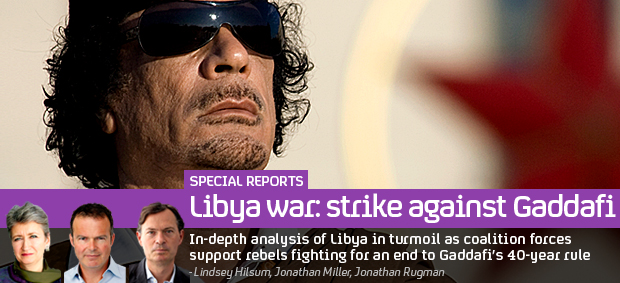Rebels launch Operation Mermaid to take Tripoli
Libya’s six month bloody uprising reaches Tripoli, as rebels launch an intense assault towards Gaddafi’s stronghold.
Forces loyal to Colonel Gaddafi have engaged the rebels in heavy fighting on the outskirts of the city. A rebel commander said the battles marked the beginning of Operation Mermaid – a nickname for Tripoli.
Machine gun fire and explosions from heavier weapons could be heard from the city centre. Fighting had taken place all through the night after residents in some parts of the city took to the streets.
Rebels say loyalist snipers were positioned around Gaddafi’s compound and on top of tall buildings nearby.
Local residents said fighting began at sunset when mosques broadcast messages on loudspeakers calling for people to go to the streets.
Accounts from residents suggested that the fighting was concentrated in the Tajourah and Fashloom districts in the east of Tripoli, and the Souk al-Jumaa district near the centre –all areas where anti-Gaddafi feeling runs high.
“We can hear shooting in different places,” another resident said. “Most of the regions of the city have gone out, mostly young people … it’s the uprising… They went out after breaking the (Ramadan) fast.”
“They are shouting religious slogans: ‘God is greatest!'”

Gaddafi has broadcast a defiant message on state television that the assault was by “rats” and had been pushed back.
“Those rats … were attacked by the masses tonight and we eliminated them,” Gaddafi said. “I know that there are air bombardments but the fireworks were louder than the sound of the bombs thrown by the aircraft.”
In the evening Gaddafi broadcast an audio message calling for Libyans to rise up and help “liberate” Tripoli from the rebels, amidst his fears that the city would burn. He promised however that he would stay to the end.
The rebels have responded with equal rhetoric calling it “zero-hour” for him.
“The zero hour has started. The rebels in Tripoli have risen up,” Abdel Hafiz Ghoga, vice-chairman of the rebel National Transitional Council (NTC), based in the eastern Libyan city of Benghazi.
Channel 4 News spoken to one rebel claiming to be in the centre of the city. There was almost constant, close gunfire of various calibres during the conversation.
He says rebel forces in his district are running short of ammo and the forces of Col Gaddafi have plenty of heavy weaponry which they are using he said. So it does appear there are extensive street battles within Tripoli itself across the day.
So is this the final act in the ousting of the Gaddafi Regime?
His spokesman Moussa Ibrahim has given a press conference holding NATO responsible for every death and saying the time has come for a ceasefire and negotiations with rebels forces who – he says – could not have advanced without NATO’s help. This is new, different and arguably desperate language from the regime in Tripoli.
State television flashed up messages on the screen urging residents not to allow rebel gunmen to hide out on their rooftops.
“Agents and al Qaeda members are trying to destabilise and sabotage the city. You should prevent them from exploiting your houses and buildings, confront them and cooperate with counter-terrorism units, to capture them,” it said.
The rebels said an uprising in the city was being coordinated with rebels approaching the city. They were fighting towards Tripoli from the town of Zawiyah, to the west, and also along the main highway to the south of the capital.
Reporters with the approaching rebels have witnessed heavy guns and mortars being transported north.
At a checkpoint south of Al-Aziziyah, rebels gathered for the move.
“Hopefully we’ll take Al-Aziziyah today and then march to Tripoli,” said Mohammed, among a group of rebels waiting for the order to move forward.
In the eastern Libyan city of Benghazi, the rebels’ main stronghold, a rebel official said fighters were being transported from the city by sea to Zawiyah, which has a port, to reinforce their colleagues advancing on Tripoli.
Meanwhile Nato forces have continued to conduct operations in Libya, striking dozens of targets within Tripoli. Nato ships also stopped 18 ships searching for arms being shipped to Tripoli, one vessel was boarded and stopped.
